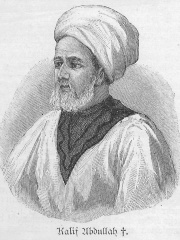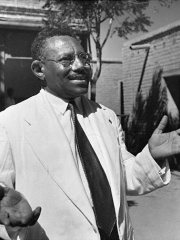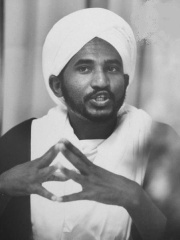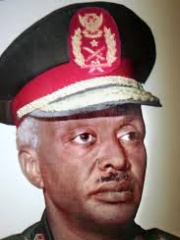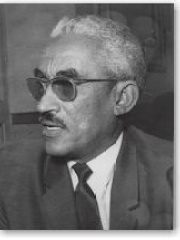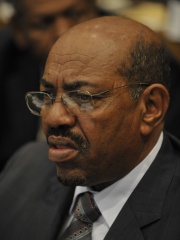
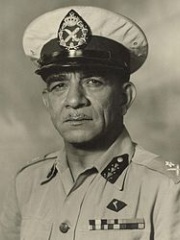
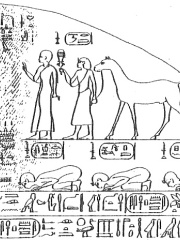
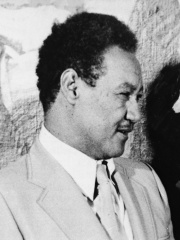
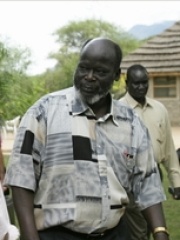

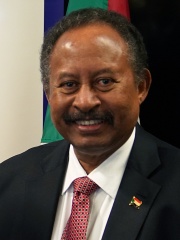
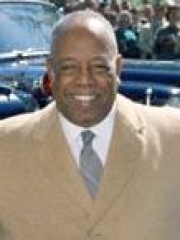
The Most Famous
POLITICIANS from Sudan
This page contains a list of the greatest Sudanese Politicians. The pantheon dataset contains 19,576 Politicians, 17 of which were born in Sudan. This makes Sudan the birth place of the 115th most number of Politicians behind Rwanda, and Uganda.
Top 10
The following people are considered by Pantheon to be the top 10 most legendary Sudanese Politicians of all time. This list of famous Sudanese Politicians is sorted by HPI (Historical Popularity Index), a metric that aggregates information on a biography's online popularity. Visit the rankings page to view the entire list of Sudanese Politicians.

1. Omar al-Bashir (b. 1944)
With an HPI of 79.00, Omar al-Bashir is the most famous Sudanese Politician. His biography has been translated into 80 different languages on wikipedia.
Omar Hassan Ahmad al-Bashir (born 1 January 1944) is a Sudanese former military officer and politician who served as Sudan's head of state under various titles from 1989 until 2019, when he was deposed in a coup d'état. He was subsequently imprisoned, tried and convicted on multiple corruption charges. Al-Bashir came to power in 1989 when, as a brigadier general in the Sudanese Army, he led a group of officers in a military coup that ousted the democratically elected government of prime minister Sadiq al-Mahdi after it began negotiations with rebels in the south; he subsequently replaced President Ahmed al-Mirghani as head of state. He was elected three times as president in elections that have been under scrutiny for electoral fraud. In 1998, al-Bashir founded the National Congress Party, which remained the dominant political party in the country until 2019. In March 2009, al-Bashir became the first sitting head of state to be indicted by the International Criminal Court (ICC), for allegedly directing a campaign of mass killing, rape, and pillage against civilians in Darfur. On 11 February 2020, the Government of Sudan announced that it had agreed to hand over al-Bashir to the ICC for trial. In October 2005, al-Bashir's government negotiated an end to the Second Sudanese Civil War, leading to a referendum in the south, resulting in the separation of the south as the country of South Sudan. In the Darfur region, he oversaw the War in Darfur that resulted in death tolls of around 10,000 according to the Sudanese Government, but most sources suggest between 200,000 and 400,000. During his presidency, there were several violent struggles between the Janjaweed militia and rebel groups such as the Sudanese Liberation Army (SLA) and the Justice and Equality Movement (JEM) in the form of guerrilla warfare in the Darfur region. The civil war displaced over 2.5 million people out of a total population of 6.2 million in Darfur and created a crisis in the diplomatic relations between Sudan and Chad. The rebels in Darfur lost the support from Libya after the death of Muammar Gaddafi and the collapse of his regime in 2011. In July 2008, the prosecutor of the International Criminal Court (ICC), Luis Moreno Ocampo, accused al-Bashir of genocide, crimes against humanity, and war crimes in Darfur. The court issued an arrest warrant for al-Bashir on 4 March 2009 on counts of war crimes and crimes against humanity, but ruled that there was insufficient evidence to prosecute him for genocide. However, on 12 July 2010, the court issued a second warrant containing three separate counts of genocide. The new warrant, like the first, was delivered to the Sudanese government, which did not recognize either the warrant or the ICC. The indictments did not allege that Bashir personally took part in such activities; instead, they said that he was "suspected of being criminally responsible, as an indirect co-perpetrator". The court's decision was opposed by the African Union, Arab League and Non-Aligned Movement as well as the governments of Libya, Somalia, Jordan, Turkey, Egypt, South Sudan, Djibouti, Eritrea, Pakistan, Algeria, Iraq, Saudi Arabia, Kuwait, Oman, Palestine, Ethiopia, Tunisia, Morocco, Lebanon, Bahrain, Qatar and the United Arab Emirates. From December 2018 onwards, al-Bashir faced large-scale protests which demanded his removal from power. On 11 April 2019, Bashir was ousted in a military coup d'état. In September 2019, Bashir was replaced by the Transitionary Military Council which transferred executive power to a mixed civilian–military Sovereignty Council and a civilian prime minister, Abdalla Hamdok. Two months later, the Forces of Freedom and Change alliance (which holds indirect political power during the 39-month Sudanese transition to democracy), Hamdok, and Sovereignty Council member Siddiq Tawer stated that Bashir would be eventually transferred to the ICC. He was convicted of corruption in December of that year and sentenced to two years in prison. His trial regarding his role in the coup that brought him into power started on 21 July 2020.

2. Mohamed Naguib (1901 - 1984)
With an HPI of 74.48, Mohamed Naguib is the 2nd most famous Sudanese Politician. His biography has been translated into 56 different languages.
Major General Mohamed Bey Naguib Youssef Qutb El-Qashlan (Arabic: محمد بي نجيب يوسف قطب القشلان; 19 February 1901 – 28 August 1984), known simply as Mohamed Naguib (Arabic: محمد نجيب), was an Egyptian military officer and revolutionary who, along with Gamal Abdel Nasser, was one of the two principal leaders of the Free Officers movement of 1952 that toppled the monarchy of Egypt and the Sudan, leading to the establishment of the Republic of Egypt. A distinguished and decorated general who was wounded in action in the 1948 Arab–Israeli War, he became the leader of the Free Officers Movement of nationalist army officers opposed to the continued presence of British troops in Egypt and Sudan, and the corruption and incompetence of King Farouk. Following the toppling of Farouk in July 1952, Naguib went on to serve as the head of the Revolutionary Command Council, the prime minister of Egypt, and later its first president, successfully negotiating the independence of Sudan (hitherto a condominium of Egypt and the United Kingdom), and the withdrawal of all British military personnel from Egypt. His tenure as president came to end in November 1954 due to disagreements with other members of the Free Officers, particularly Nasser, who forced him to resign and succeeded him as president.

3. Piye (800 BC - 716 BC)
With an HPI of 69.49, Piye is the 3rd most famous Sudanese Politician. His biography has been translated into 44 different languages.
Piye (also interpreted as Pānkhi, Piankhy, Paiānkhi, Piānkhi, or Paānkhi) was an ancient Kushite king and founder of the Twenty-fifth Dynasty of Egypt, who ruled Egypt from 744–714 BC. He ruled from the city of Napata, located deep in Nubia, modern-day Sudan.

4. Gaafar Nimeiry (1930 - 2009)
With an HPI of 68.38, Gaafar Nimeiry is the 4th most famous Sudanese Politician. His biography has been translated into 38 different languages.
Gaafar Muhammad an-Nimeiry (otherwise spelled in English as Gaafar Nimeiry, Jaafar Nimeiry, or Ja'far Muhammad Numayri; Arabic: جعفر محمد النميري; 1 January 1930 – 30 May 2009) was a Sudanese military officer and politician who served as the fourth head of state of Sudan from 1969 to 1985, first as Chairman of the National Revolutionary Command Council and then as President. A military officer, he came to power after a military coup in 1969. Establishing a one-party state, with his Sudanese Socialist Union as the sole legal political entity in the country, Nimeiry pursued socialist and Pan-Arabist policies and close collaboration with Gamal Abdel Nasser of Egypt and Muammar Gaddafi of Libya. In 1971 Nimeiry survived a pro-Soviet coup attempt, after which he forged an alliance with Mao Zedong of China, and, eventually, with the United States as well. In 1972 he signed the Addis Ababa Agreement, ending the First Sudanese Civil War. In his last years in power he also adopted aspects of Islamism, and in 1983 he imposed sharia law throughout the country, precipitating the Second Sudanese Civil War. He was ousted from power in 1985 and went into exile in Egypt. He returned in 1999 and unsuccessfully ran in the presidential elections in 2000.
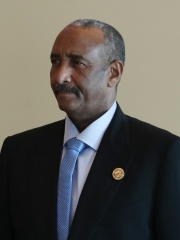
5. Abdel Fattah al-Burhan (b. 1960)
With an HPI of 67.61, Abdel Fattah al-Burhan is the 5th most famous Sudanese Politician. His biography has been translated into 42 different languages.
Abdel Fattah al-Burhan Abdelrahman al-Burhan (born 1960) is a Sudanese military officer who has been the de facto leader of Sudan since 2019. Following the Sudanese Revolution in April 2019, he was handed control of the military junta, the Transitional Military Council, a day after it was formed, due to protesters' dissatisfaction with the establishment ties of initial leader Ahmed Awad Ibn Auf. He served as chairman of the TMC until a draft constitutional declaration signed with civilians went into effect on 17 August and a collective head of state Transitional Sovereignty Council was formed on 21 August, also to be initially headed by al-Burhan. The 2020 Juba Agreement allowed al-Burhan to continue to lead the Sovereignty Council for another 20 months, rather than stepping down as planned in February 2021. Al-Burhan seized power in a coup d'état in October 2021, dissolved the Sovereignty Council, and reconstituted it the following month with new membership, keeping himself as chairman. He was formerly the General Inspector of the Sudanese Armed Forces (SAF). He is leading the SAF against the Rapid Support Forces (RSF) in the ongoing Sudanese civil war. Al-Burhan survived an assassination attempt in July 2024.

6. John Garang (1945 - 2005)
With an HPI of 65.06, John Garang is the 6th most famous Sudanese Politician. His biography has been translated into 38 different languages.
John Garang De Mabior (June 23, 1945 – July 30, 2005) was a Sudanese politician and revolutionary leader. From 1983 to 2005, he led the Sudan People's Liberation Army/Movement (SPLA/M, Now known as South Sudan People's Defense Forces) as a commander in chief during the Second Sudanese Civil War. He served as First Vice President of Sudan for three weeks, from the comprehensive peace agreement of 2005 until his death in a helicopter crash on July 30, 2005. A developmental economist by profession, Garang was one of the major influences on the movement that led to the foundation of South Sudan’s independence from the rule of Sudanese president Omar al-Bashir.

7. Osman Hussein (b. 1951)
With an HPI of 63.27, Osman Hussein is the 7th most famous Sudanese Politician. His biography has been translated into 16 different languages.
Osman Hussein (Arabic: عثمان حسين, romanized: ʻUthmān Ḥusayn; born 1951) is a Sudanese politician who served as acting prime minister of Sudan between 19 January 2022 and 30 April 2025.

8. Abdalla Hamdok (b. 1956)
With an HPI of 62.30, Abdalla Hamdok is the 8th most famous Sudanese Politician. His biography has been translated into 39 different languages.
Abdalla Hamdok Al-Kinani (also transliterated Abdallah, Hamdouk, AlKinani; Arabic: عبدالله حمدوك الكناني, romanized: ʻAbd Allāh Ḥamdūk al-Kinānī; born 1 January 1956) is a Sudanese public administrator who served as the 15th prime minister of Sudan from 2019 to October 2021, and again from November 2021 until his resignation in 2022. Prior to his appointment, Hamdok served in numerous national and international administrative positions. From November 2011 to October 2018, he was deputy executive secretary of the United Nations Economic Commission for Africa (UNECA). UNECA staff described Hamdok as "[a] diplomat, a humble man and a brilliant and disciplined mind". In 2020, Hamdok was named among Bloomberg's 50 Most Influential figures of the year. Following the transfer of power from the Transitional Military Council to the Sovereignty Council of Sudan during the 2019 plan for a transition to democracy, the Sovereignty Council appointed Hamdok as prime minister. He was sworn in on 21 August 2019. During the October 2021 Sudanese coup d'état, he was kidnapped and moved to an undisclosed location. The European Union, the United States, and other Western powers stated that they continued to recognise the Hamdok cabinet as "the constitutional leaders of the transitional government". On 21 November 2021, all political prisoners were freed and Hamdok was reinstated as prime minister as part of an agreement with the military. Hamdok resigned on 2 January 2022 amid continuing protests.

9. Ibrahim Abboud (1900 - 1983)
With an HPI of 61.56, Ibrahim Abboud is the 9th most famous Sudanese Politician. His biography has been translated into 31 different languages.
Ibrahim Abboud (Arabic: إبراهيم عبود; 26 October 1900 – 8 September 1983) was a Sudanese military officer and political figure who served as the head of state of Sudan between 1958 and 1964 and as President of Sudan in 1964; however, he soon resigned, ending Sudan's first period of military rule. A career soldier, Abboud served in World War II in Egypt and Iraq. In 1949, Abboud became the deputy Commander in Chief of the Sudanese military. Upon independence, Abboud became the Commander in Chief of the Military of Sudan.

10. Hassan Al-Turabi (1932 - 2016)
With an HPI of 61.48, Hassan Al-Turabi is the 10th most famous Sudanese Politician. His biography has been translated into 27 different languages.
Hassan al-Turabi (Arabic: حسن الترابي, romanized: Ḥasan al-Turābī; 1 February 1932 – 5 March 2016) was a Sudanese politician and scholar. He was the alleged architect of the 1989 Sudanese military coup that overthrew Sadiq al-Mahdi and installed Omar al-Bashir as president. He has been called "one of the most influential figures in modern Sudanese politics" and a "longtime hard-line ideological leader". He was instrumental in institutionalizing Sharia (Islamic law) in the northern part of the country and was frequently imprisoned in Sudan, but these "periods of detention" were "interspersed with periods of high political office". al-Turabi was leader of the National Islamic Front (NIF) (which later changed its name to National Congress in the late 1990s), a political movement that developed considerable political power in Sudan while never obtaining significant popularity among Sudanese voters. It embraced a "top down" approach to Islamisation by placing party members in high posts in government and security services. al-Turabi and the NIF reached the peak of their power from 1989 following a military coup d'état, until 2001, as what Human Rights Watch have called "the power behind the throne", head of the first Sunni Islamist movement to take control of a state. al-Turabi oversaw highly controversial policies such as the creation of the "NIF police state" and associated NIF militias that consolidated Islamist power and prevented a popular uprising, but according to Human Rights Watch committed many human rights abuses, including "summary executions, torture, ill treatment, arbitrary detentions, denial of freedoms of speech, assembly, and religion, and violations of the rules of war, particularly in the south". Turabi was a leader of opposition to the American–Saudi "coalition forces" in the Gulf War, establishing in 1990–1991 the Popular Arab and Islamic Congress (PAIC), a regional umbrella for political Islamist militants, headquartered in Khartoum. After 1996, al-Turabi and his party's "internationalist and ideological wing" saw a decline in influence in favor of more pragmatic leaders, brought on by the imposition of UN sanctions on Sudan in punishment for Sudan's assistance to Egyptian Islamic Jihad in their attempt to assassinate Egyptian President Hosni Mubarak. al-Turabi was out of power beginning in 1999, leading a splinter group of the National Congress known as the Popular National Congress. He was imprisoned by Omar Al-Bashir on 17 January 2011 for nine days, following civil unrest across the Arab world. He died in 2016 without facing trial for his role in the 1989 coup.
People
Pantheon has 17 people classified as Sudanese politicians born between 800 BC and 1960. Of these 17, 5 (29.41%) of them are still alive today. The most famous living Sudanese politicians include Omar al-Bashir, Abdel Fattah al-Burhan, and Osman Hussein. The most famous deceased Sudanese politicians include Mohamed Naguib, Piye, and Gaafar Nimeiry.
Living Sudanese Politicians
Go to all RankingsOmar al-Bashir
1944 - Present
HPI: 79.00
Abdel Fattah al-Burhan
1960 - Present
HPI: 67.61
Osman Hussein
1951 - Present
HPI: 63.27
Abdalla Hamdok
1956 - Present
HPI: 62.30
Ahmed Awad Ibn Auf
1954 - Present
HPI: 57.78
Deceased Sudanese Politicians
Go to all RankingsMohamed Naguib
1901 - 1984
HPI: 74.48
Piye
800 BC - 716 BC
HPI: 69.49
Gaafar Nimeiry
1930 - 2009
HPI: 68.38
John Garang
1945 - 2005
HPI: 65.06
Ibrahim Abboud
1900 - 1983
HPI: 61.56
Hassan Al-Turabi
1932 - 2016
HPI: 61.48
Abdallahi ibn Muhammad
1846 - 1899
HPI: 61.38
Ismail al-Azhari
1901 - 1969
HPI: 60.74
Sadiq al-Mahdi
1935 - 2020
HPI: 60.18
Abdel Rahman Swar al-Dahab
1934 - 2018
HPI: 59.82
Ahmed al-Mirghani
1941 - 2008
HPI: 59.81
Babiker Awadalla
1917 - 2019
HPI: 56.48
Overlapping Lives
Which Politicians were alive at the same time? This visualization shows the lifespans of the 11 most globally memorable Politicians since 1700.


